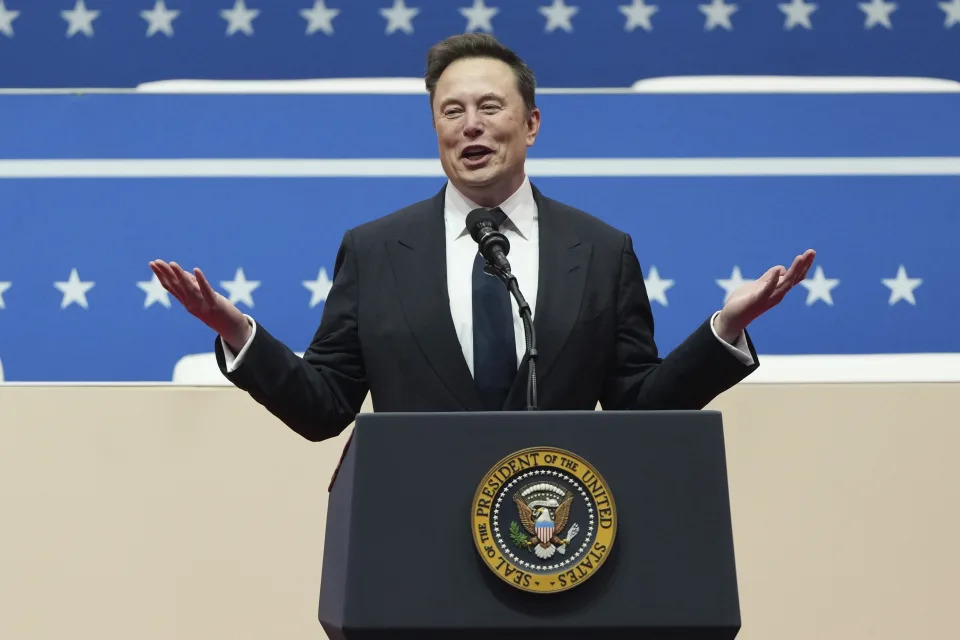As Elon Musk goes line by line down the federal budget to slash, as he claims, trillions of dollars in waste, he's offering up sacrifices akin to what bad personal finance gurus target in an individual's spending . The daily latte. An iPhone. Avocado toast.
Take, for example, USAID, a program that spends about $40 billion a year and one that Musk unceremoniously worked to shut down this week. USAID's spending makes up 0.6% of the overall $6.9 trillion federal budget . That's like cutting out $464 a year (or almost 93 lattes) from the average American's $77,300 annual expenditures.
Musk also railed against the $8 million the government spends each year for subscriptions to Politico's premium paywalled content, a whopping 0.000115942% of the federal budget, or the equivalent of $9 (or almost two lattes) of the average American's spending.
Sure, all spending — either on the federal or individual level — should be revisited every now and again. But these are hardly savings that get you meaningfully toward your bigger financial goals and certainly nothing to crow about.
If you really want to make a dent in a budget, focus on the behemoth costs. For individuals, that's typically big-ticket items like housing and transportation. For the federal government, it's our old-age programs.
It also helps to stop other unnecessary binges on the side.
"You can’t significantly cut the deficit just by cutting waste, firing bureaucrats, and defunding immigrants and foreigners. There are no easy shortcuts," Jessica Riedl, a senior fellow at the fiscally conservative Manhattan Institute, posted this week on X . "You have to stop cutting taxes and then address Social Security, Medicare, defense, and a lot of other popular programs."

Of course, Social Security and Medicare are much harder to deal with because, one, these programs provide essential services, and two, their costs keep going up. But to realistically undertake our budget shortfalls, we’d need to resolve these programs' funding problems.
Instead, the Trump administration's policies make the whole thing worse.
Let's start with Social Security. Not only is the social welfare program the biggest line item on the US budget at $1.5 trillion, but it's also anticipated to be the largest contributor to the government's expected spending increase over the next decade, according to the Committee for a Responsible Federal Budget (CRFB). This is simple demographics. We've got more older people than younger ones, and they keep retiring.
At the same time, Social Security's reserve funds are expected to run out in 2035, at which point payroll taxes that finance the program will cover just 77% of seniors' benefits. That's a huge pay cut for older Americans, especially among those who rely primarily on Social Security for their living expenses.
Medicare is in a similar boat. Reserves for the federal healthcare insurance program are estimated to run dry in 2036 — again because of an aging population. It's the second-largest budget item at $912 billion and the second-largest contributor to our spending growth over the next 10 years.
Compounding the problem is President Trump's tax priorities, which would further jeopardize the programs' funding. This week, the president reportedly told Republican lawmakers he wants to go forward on eliminating taxes on tips, Social Security benefits, and overtime pay, which go to the Social Security and Medicare Trust Funds.
As a result, Social Security would lose $1.85 trillion over 10 years, according to a CRFB report last year , accelerating when the program's reserves would be exhausted. Though not considered in this report, Medicare's funding would be hit as well, the author of the report told me at the time.
Add to that Trump's nominee to run the Centers for Medicare and Medicaid Services , who is a big cheerleader for expanding Medicare Advantage, or MA, the private-sector alternative to traditional Medicare.
These plans are actually notorious for wasteful spending — something the Biden administration began addressing with new rules Trump wants to roll back. Overall, MA insurers overcharged taxpayers by $80 billion last year. That right there are two USAID agencies (or 16 billion lattes). It stands to reason that expanding this program risks ballooning those overpayments, adding to the wasteful spending Musk heroically is trying to trim.

Fear not, Musk is digging into Medicare's books now. Maybe he'll also discover those overpayments that have already been found . Still, his efforts may all be moot if at the same time Republicans go forward with their spending spree.
In addition to tax cuts, Trump is pushing to extend his first term tax changes, increase the state and local tax deduction, and introduce new tax breaks for US-made goods. In total, those would cost $5 trillion to $11.2 trillion over 10 years , per the CRFB, and swell the debt to 132-149% of GDP by 2035.
Musk will need to eliminate another 11-27 more programs the size of USAID to simply make up for that additional spending the administration is considering. And that's before he can address the spending we're already doing.
"Want to cut spending and the deficit? How about they stop passing budget-busting bills," Riedl posted. "Don’t brag about your coupon-clipping frugality at the same time you are buying a $250,000 Ferrari."
In other words, forget the avocado toast, Elon.
Correction: The original version of this article miscalculated the percentage of Politico's subscription costs of the total federal budget.
@JannaHerron .
Read the latest financial and business news from Yahoo Finance





